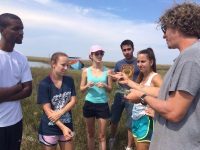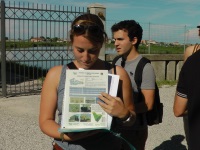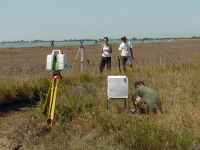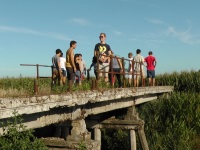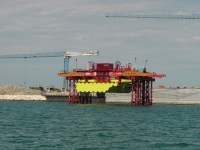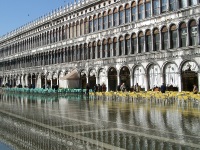|

The Nicholas School of the Environment (Duke University) and Venice International University offer the third edition of a Summer Program that provides training in key topics about the impact of sea level rise on coastal areas and cities, and about adaptation and mitigation strategies.
Environmental Management in a Changing World: Coping with Sea Level Rise
2016 edition - 11-23 July 2016
 Detailed Program Detailed Program
 Program Schedule Program Schedule
The symptoms of Global Warming, and in particular an accelerating sea level rise, are already detectable in several regions of the globe. The discussion, at a governmental level, on the importance of reducing greenhouse gas emissions is ongoing, but strategic decisions have to be taken soon in particular in regard to low-lying coastal areas and cities, considering that coastal areas less than 5 meters above sea level are home to roughly 200 million people worldwide (World Ocean Review 2013). The Venice Lagoon will be used as a “laboratory”, the ideal location to study the intertwined dynamics of human and natural systems under a climate change. The Venice Lagoon is a diverse ecosystem providing invaluable services, which has been deeply transformed over the long history of the Venetian State and, in more recent years, by large scale engineering works. The area is also an exceptionally well-documented case of the coexistence of the natural and the built environments, of the tension between sustainable and unsustainable uses of natural resources, and of the potential for vigorous political controversy over possible adaptation strategies. VIU is uniquely positioned, both geographically and for the suite of multidisciplinary knowledge which it encompasses, to provide an educational program of unmatched quality on these topics.
Target:
Graduate students and working professionals from any university, research institute, or other organization (private companies, government agencies, NGOs) with an interest in environmental issues and ability to read and write fluently in English. Advanced undergraduates will also be considered.
100% of participants rated the program as "highly valuable" in 2015.
What they say about us:
"The classes and professors at VIU were incredible, I met so many wonderful people and learned a lot"
"The ratio of students to professors was ideal"
"The facilities of VIU are great"
"A positive aspect was the opportunity to network"
Course aim:
What will be the impact of sea level rise on the world's coastal areas and coastal cities? What are the social and economical consequences? What is the forecasted impact on the population health? Should we plan for a "sustainable development" or a "strategic retreat"? And if a strategic retreat is chosen what are the implications for our cultural heritage and legacy? What monitoring and management tools are currently available or should be developed in the near future?
The course aims to give students a broad perspective on the impact of sea level rise upon coastal areas from the social, economical and environmental point of view. Adaptation and mitigation strategies will be analyzed and students will be involved in discussions on critical management issues, developing their own critiquing concepts in a multidisciplinary framework. Participants will learn, in class and in the lab, the use of operational tools for coastal zone monitoring and management, and will participate in four field campaigns aimed at exploring the most up-to-date techniques for coastal defense and protection. The Venice Lagoon will be used as a "laboratory", the ideal setup to study the intertwined dynamics of human and natural systems. The Venice Lagoon is a diverse ecosystem providing invaluable services, which has been deeply transformed over the long history of the Venetian State and, in more recent years, by extremely impacting engineering works. The area also has a rich history with people whose families have resided in the city for generations and have strong attachments to the area. Hence, it is an exceptionally well-documented case of the coexistence of the natural and the built environments, of the tension between sustainable and unsustainable uses of natural resources, and the potential for vigorous political controversy over possible adaptation strategies. The MOSE system, the systems of gates currently being constructed to protect the city of Venice from extreme high tides, is just an example of the important infrastructures that the students will explore.
Lectures will be led by world-class professors and researchers from the Nicholas School of the Environment, (Duke University - US) and Venice International University.
Topics:
• Causes and consequences of global environmental change
• Modelling and prediction of environmental changes in coastal areas
• Social, economic and political impacts of sea level rise
• Environmental monitoring and management of coastal morphology and water quality
• The resilience of coastal human-natural systems
• Analysis of extreme events
• Sustainable development along the coast: strategic retreat or coastal protection/conservation?
• Global health and climate change: future scenarios in coastal areas
Course organization:
The course duration is 2 weeks. Students will attend lectures and labs, 6 days per week and will participate in field trips in the Venice Lagoon and its surrounding.
Credits:
This course has been included in the Master in Environmental Management (MEM) course listing at the Nicholas School of the Environment, Duke University. Students who successfully complete the course will receive 2 MEM Credits from the Nicholas School.
An official Duke University, Nicholas School Diploma will be issued at the end of the course.
Number of ECTS credits allocated: 3.
Duration and period:
2 weeks, 11 - 23 July 2016
Fees:
Students of VIU member-universities: €850 (incl. 22% VAT)
Students of other univeristies: €1250 (incl. 22% VAT)
Professionals: €1800 (incl. 22% VAT)
The tuition and fees cover all teaching materials and field trips. Accommodation and meals are not included.
VIU will provide information and support in sourcing suitable accommodation in the city of Venice.
Location:
Venice International University, Island of San Servolo, Venice (Italy).
List of courses
|
Course title
|
Professor |
|
Global environmental change, global warming, changing oceans
and sea level rise
|
Georg Umgiesser
(ISMAR-CNR)
|
|
Extreme events in coastal areas: data analysis and modelling
|
Marco Marani
(Duke University)
|
|
The impact of sea level rise and climate change on global water resources
|
Mario Putti
(Duke University)
|
|
Coastal wetlands ecology, restoration and management
|
Tjeerd Bouma
(Royal Netherlands Institute
of Sea Research)
|
|
Coastal environmental change processes: modelling and prediction
|
Andrea D'Alpaos
(VIU – Padova University)
|
|
Environmental monitoring of coastal morphology and water quality
(lectures and labs)
|
Sonia Silvestri
(Duke University)
|
|
Planning for Natural Hazards and Climate Change Adaptation in Coastal Areas
|
Gavin Smith
(UNC Chapel Hill)
|
|
Climate change, sea level rise and global health in coastal areas
|
William Pan
(Duke University)
|
Learning outcomes of the program:
Students will explore and become familiar with the following topics:
1) causes and consequences of global environmental change;
2) modelling and prediction of environmental changes in coastal areas;
3) social, economic and political impacts of sea level rise;
4) environmental monitoring and management of coastal morphology and water quality;
5) the resilience of coastal human-natural systems;
6) sustainable development along the coast;
7) global health and climate change: future scenarios in coastal areas.
At the end of the course students will be familiar with the physical processes that generate the global warming phenomenon, and will understand the consequences of changing oceans and rising sea levels. Satellites and other measurement tools will be an integral part of the training, and students will develop an extensive knowledge about models, predictions, and related uncertainties. Students will be required to participate in discussions on the impact of global environmental change on coastal areas, and will understand the importance of new policies for the management of coastal regions and cities and their economic implications.
|





